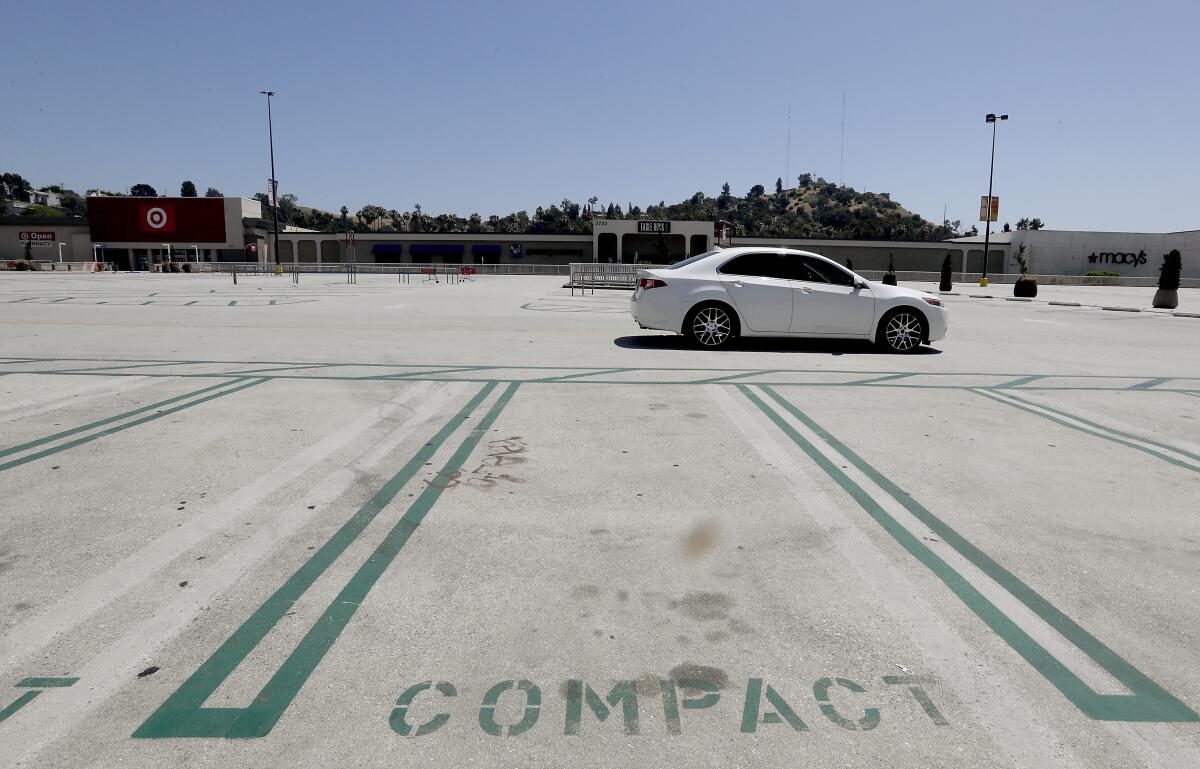Column: Car insurers gave everyone a pandemic discount. Now some are raising rates

- Share via
It was a relief for most people when vehicle insurers said a few months ago they’d offer temporary discounts to reflect the fact that few of us were driving because of the pandemic.
In most cases, those discounts are now in the rearview mirror, meaning our rates are back to pre-pandemic levels.
And now comes the prospect of some insurance companies recouping their losses by raising rates for the second half of the year.
David Martin, 69, suspects this happened to him when he received a bill from Allstate the other day for his next six months in premiums.
The Sherman Oaks resident told me the company had charged him $171 a month prior to the pandemic to cover his 2017 Lincoln Continental.
Because of the coronavirus and the fact that he’s virtually stopped driving, he received a discount of $77 for April, May and June combined.
Now Allstate is informing Martin that his monthly premium for July through December is jumping to almost $190.
“If you’re going to give me $77 as a discount and then charge over a hundred bucks more in a rate increase, what’s the point?” he asked.
Allstate announced in early April that it would give customers a 15% break on their vehicle coverage for April and May. It later extended the rate relief by another month.
“This is fair because less driving means fewer accidents,” said Allstate’s chief executive, Tom Wilson.
After I wrote a column asking why other insurers weren’t doing the same, California Insurance Commissioner Ricardo Lara ordered all coverage providers to offer discounts for March, April and May. He subsequently required a discount for June as well.
Lara’s office estimates more than $1 billion was returned to California drivers. The average policyholder received a total break of $57, or nearly 4% of total average annual premiums.
So what now? The pandemic continues to rage in much of the state and it doesn’t look like many of us will be returning to the office or schools any time soon.
Will there be additional discounts?
Lara told me on Tuesday that California’s halting attempts to reopen the economy mean “the decline in driving and accidents will continue, and the cost of insurance premiums needs to reflect those changes in risk.”
“Depending on your driving patterns,” he said, “if you received a discount for March and April, you should receive one as long as your reduced risk of accidents continues.”
However, Lara isn’t ordering insurers to give back money right away. He’s ordering insurers to look at people’s driving habits over coming months and determine if further discounts are warranted.
UC Davis researchers determined that when many state residents started staying home to ward off the coronavirus, auto accidents were reduced by half.
That translates to about 15,000 fewer collisions per month, and roughly 6,000 fewer crash-related injuries and fatalities monthly.
“There is no equivalent in our recent transportation history to such large changes in vehicle movement on our state and local roads,” the researchers noted.
Driving may have picked up a bit in recent weeks, but roads are still relatively uncongested.
I reached out to most leading insurers asking about their plans for vehicle rates. Some ignored my questions. Others directed me to take up the matter with an industry trade association.
Of those that did respond, each said they would never, ever try to recoup recent discounts while renewing people’s policies for the remainder of the year, even though rates may be increasing.
Tammy Kotula, an Allstate spokeswoman, said the company “will continue to evaluate driving data and make decisions that put customers first.”
I asked why some people’s rates are going up despite the fact that driving for the most part remains down. Kotula declined to elaborate.
Joe Case, a Nationwide spokesman, said the company isn’t focusing on the here and now when it comes to premiums.
“Nationwide is taking the longer view while continuing to monitor consumer driving behaviors and how they impact future miles driven and accident frequencies,” he said.
On the other hand, State Farm says it’s cutting rates. Sevag Sarkissian, a company spokesman, said State Farm plans to lower people’s premiums over coming months by an average of 6.5%.
Vehicle insurers began 2020 with a solid financial cushion. Providers of property coverage pocketed more than $61 billion in profit last year, up slightly from the year before, according to the American Property Casualty Insurance Assn.
The trade group now sees “a period of increased uncertainty due to the coronavirus,” and says “insurers will be closely monitoring legislative, regulatory and lawsuit abuse trends that could negatively impact the industry’s financial stability.”
That’s an issue for shareholders, to be sure, but it doesn’t change the fact that most of us still aren’t driving, and the circumstances that warranted discounts a few months ago are largely unchanged today.
This isn’t like saying homeowners deserve a break on their insurance premiums because their neighborhood hasn’t burned down. Insurance is a way of managing the unknown, and you never know when a fire might erupt.
When it comes to vehicle coverage, however, the coverage criteria are very much known.
If you’re not driving because of circumstances beyond your control, your risk of an accident is greatly reduced and the insurer’s exposure to potential losses is accordingly lower.
“The number of cars on the road continues to be a fraction of normal as governments extend shelter-in-place orders and roll back business reopenings due to re-spiking virus cases,” said Amy Bach, executive director of the advocacy group United Policyholders.
She said it shouldn’t take an order from the insurance commissioner for coverage providers to do right. “They should do it now, voluntarily,” Bach said.
Janet Ruiz, a spokeswoman for the industry-backed Insurance Information Institute, said that if the cost of your coverage goes up but your driving habits haven’t changed since the pandemic began, contact your provider and ask if a rate reduction is possible.
That’s good advice, but you see what’s happening, right?
The first time around, insurers took it upon themselves to treat people fairly. Now they’re saying that if you want fair treatment, you may need to ask for it.
That is, as they say, very on-brand for the insurance industry.
More to Read
Inside the business of entertainment
The Wide Shot brings you news, analysis and insights on everything from streaming wars to production — and what it all means for the future.
You may occasionally receive promotional content from the Los Angeles Times.











